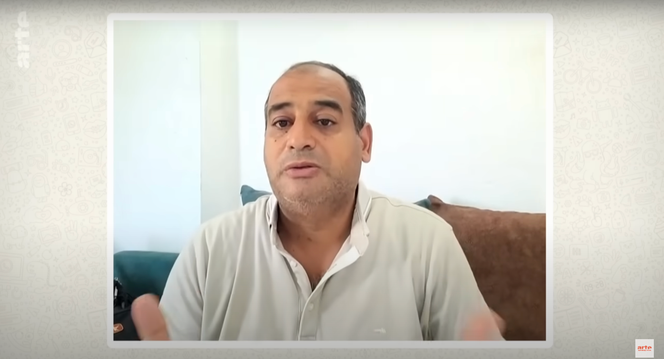


It's become a ritual. Every morning, when the internet isn't down, and when he isn't forced to flee with his family from the advancing Israeli army, Rami Abou Jamous posts two messages on "Gaza. Vie," the WhatsApp group he shares with over 150 French-speaking journalists and humanitarians: "Salut les amis" and "Tjrs vivants." When the Gazan reporter is slow to signal, to reply to the "Bonjour Rami" of the subscribers to this precious information channel, concern soars. And when, after a few hours of unbearable silence, the two precious messages light up on smartphone screens, the application echoes with a huge "phew" of digital relief.
On Saturday, October 12, the group received a thunderous round of applause. The 31st edition of the Bayeux Calvados-Normandie war correspondents' prize awarded Jamous no less than three prizes: the written press prize, the long-form television prize and the Ouest-France-Jean Marin prize. It was a "grand slam," unprecedented in the history of this event, which recognizes the dogged work accomplished by this 46-year-old Palestinian, despite the war that is devouring the Gaza Strip: his logbook, published by Orient XXI, an online magazine devoted to news from the Arab world, and his television reports, broadcast on several French channels.
In honoring Jamous, the Bayeux Prize also pays tribute to the courage and resilience of all Gaza's media professionals, a profession bled dry. In one year, over 130 journalists have been killed by Israeli forces in Gaza, including more than 30 in the course of their work, according to the NGO Reporters Without Borders.
After the morning ritual on his WhatsApp group, Jamous continues with the night's news. It's an invariably depressing account, woven from bombardments, videos of mutilated children and forced displacements. At regular intervals during the day, he posts communiqués from Hamas or the Israeli army, answers questions from his followers and shares information or analysis in the form of voice messages. It's a job of monitoring and deciphering, carried out with flawless precision and a miraculously affable tone. It's his trademark. If he gave his WhatsApp group, created in 2018, the name "Gaza. Vie," contrary to the images traditionally associated with this territory, it is to bear witness to the endurance of its inhabitants, to their fortitude.
Since the start of the war in October 2023, following Hamas's bloody attack on Israel, Jamous has spiced up his newsfeed with more personal tidbits about those closest to him, his wife Sabah and their 3-year-old son Walid. As well as commenting on the methodical, relentless destruction of his land, the journalist recounts their day-to-day survival: their epic flight from northern Gaza to Rafah, in the south of the enclave. Then, in a second forced exodus, they settled in Deir al-Balah, in the center, near the beach, which was transformed into a huge makeshift camp for thousands of displaced people. "What's new in this war is that I'm also the one getting the information," said Jamous.
You have 61.49% of this article left to read. The rest is for subscribers only.
